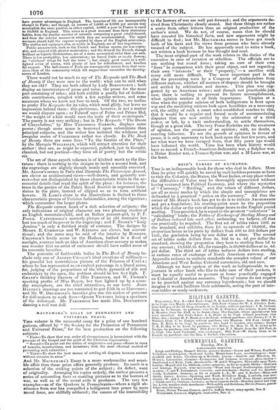MACNAMARA'S ESSAY ON PERMANENT AND UNIVERSAL PEACE.
Tam volume is the successful essay for a prize of one hundred guineas, offered by "the Society for the Promotion of Permanent and Universal Peace," for the best production on the following subjects : "First—To show that war, under all circumstances, is inconsistent with the precepts of the Gospel and the spirit of the Christian dispensation : "Second—To point out the duties of magistrates and peace-officers in cases of tumults, insurrections, and invasions; with the most effectual method of preventing such calamities : "Third—To show the best means of settling all disputes between nations without recourse to arms."
And Mr. MACNAMARA'S Essay is a more workmanlike and sensi- ble affair than these prize offers generally produce. Its merit is a selection of the striking points of the subject ; its defect, want of originality. Arranging his topics orderly, the author presents a series of astounding facts or startling pictures as to the horrors of war, as well as of the moral evils it produces. The very few examples—as of the Quakers in Pennsylvania—where a rigid ab- stinence from war has compelled a belligerent into peace by mere moral force, are skilfully adduced ; the causes of the insensibility
to the horrors of war are well put forward ; and the arguments de- rived from Christianity clearly stated. But these things are rather a cento from other writers than an original production of the author's mind. We do not, of course, mean that he should have invented his historical facts, and new arguments might be difficult to find ; but Mr. MACNAMARA seems to have got much both of his facts and his views from persons who have already treated of the subject. He has apparently read to write a book, not written a book because he has thought and read.
The most original part of the work relates to the duties of the executive in case of invasion or rebellion. The officials are to use nothing but moral force ; taking no care of their own " lives " in comparison with their great object, and not regarding their own " interests " or their "property," — a sacrifice with many still more difficult. The most important part is the plan for preventing wars by a Congress of Ambassadors from different nations, whither all matters of dispute should be brought and settled by arbitration and decree. This plan was sug- gested by an American writer; and though not practicable just now, there is nothing to prevent its future accomplishment,
when opinion renders it of little importance. Utopian at a time when the popular opinion of both belligerents is bent upon war and the mediating nations look upon hostilities as a necessary evil, the utility of such a court when established reaches to this, that it would be a regular and formal mode of accommodating disputes that are ' now settled by the arbitration of a third power, or left, by a tacit understanding, to settle themselves, though at a great risk. The very Peace Societies are the creatures of opinion, not the creators of an opinion ; with, no doubt, a reacting influence. To see the growth of opinions in favour of peace, it is only necessary to look back upon the last few years, and see what wars we have escaped from, that fifty years ago would have inflamed the world. Time has been when history would have to record a French-American-Indemnity war, a Sulphur war, a Maine Border war, a Franco-Syrian war, and a M‘Lson war, at the least.


























 Previous page
Previous page